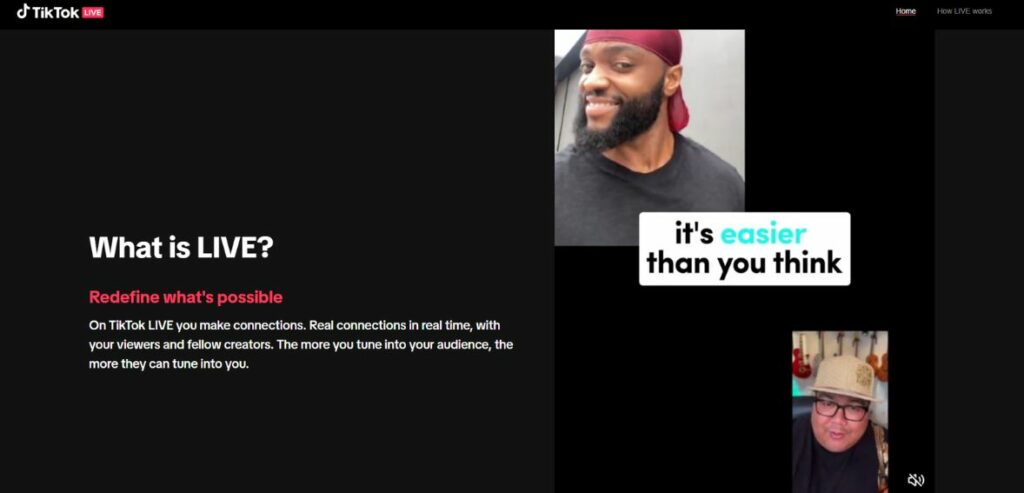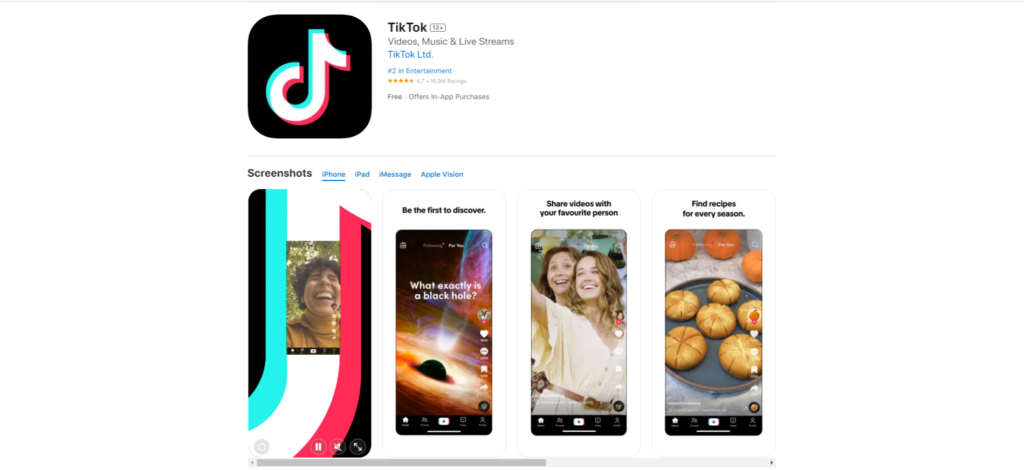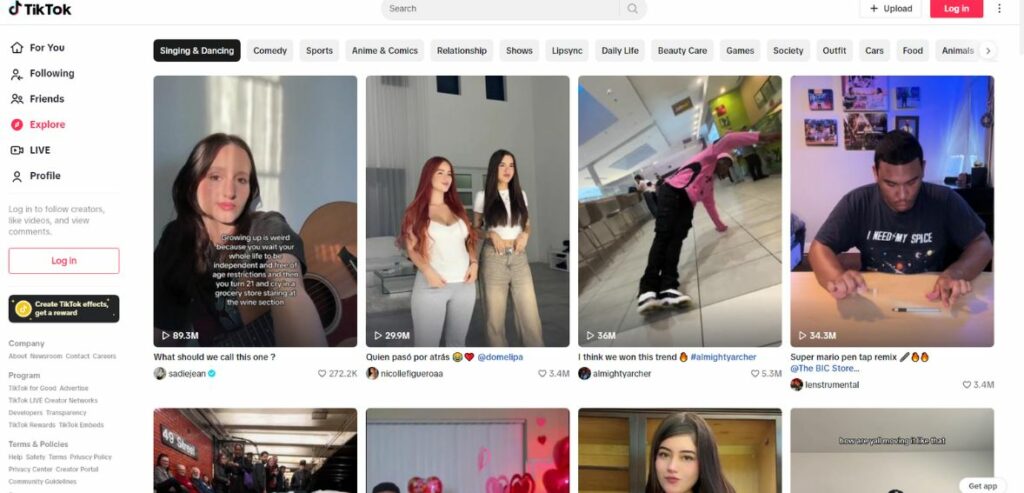Recently, the US House of Representatives passed a bill that mandates ByteDance, the Chinese parent company of TikTok, to divest its US assets within a year or face a nationwide ban. This significant move intensifies the pressure on TikTok’s operations in the United States. The bill is now pending the Senate’s approval. This legislative move quickens the implementation of a measure that TikTok has been contesting for weeks. Should the House’s stance prevail, TikTok might be compelled to find a new owner or the government may ban TikTok from the United States.
Key Takeaways
- Legislative Threat to TikTok: The US House of Representatives passed a bill requiring ByteDance, TikTok’s parent company, to divest its US assets within a year or face a nationwide ban. This legislation, linked to significant foreign aid packages, signifies bipartisan concern over national security and data privacy.
- TikTok’s Response and Backlash: TikTok has actively opposed the bill, urging users to contact lawmakers, but these efforts appear ineffective. Push notifications to users criticizing the bill’s impact have garnered negative attention, highlighting concerns over the platform’s influence, particularly on young users.
- National Security Concerns: Congressional hearings have expressed worries that TikTok’s ties to China could lead to interference in US elections and data exploitation. The Department of Justice emphasized the risks posed by ByteDance’s Chinese headquarters, raising border security implications.
- Projected Timeline and Potential Buyers: The proposed legislation to ban TikTok sets a timeline for its sale or closure, possibly coinciding with the US presidential inauguration. Potential buyers could shape TikTok’s future, including individuals like Steven Mnuchin and Kevin O’Leary, tech giants like Microsoft and Oracle/Walmart, and even Elon Musk. However, uncertainties remain regarding legal challenges and regulatory scrutiny.
Proposed Legislation Threatens TikTok’s Future in the US

Users in the US may soon see the platform change hands or face a potential TikTok ban. This past Saturday, the House approved a bill prohibiting TikTok from operating in the US unless its Chinese parent company, ByteDance, divests its stake within a year. The legislation is now set to go before the Senate, where it is likely to pass, partly because it is linked to a significant foreign aid package for Ukraine, Israel, and other US allies, which has broad bipartisan support.
Concerns have been raised about TikTok due to its addictive video content and its ownership by ByteDance. This ownership has led to worries among US lawmakers and security experts that the Chinese government could access the personal data of millions of American TikTok users.
In response, TikTok has been actively encouraging its users to contact their representatives to oppose the bill. Recently, TikTok even sent push notifications to some users, urging them to contact their lawmakers and claiming that the legislation threatens their constitutional right to access the platform. Despite this being a minimal-cost strategy, given its large user base, it appears to have backfired. Some legislators have pointed out that TikTok’s capability to send mass push notifications, often to a young audience, highlights the potential dangers of the app.
TikTok has criticized the legislative move, stating that it is regrettable that lawmakers are exploiting the guise of vital foreign and humanitarian aid to push through a bill that would infringe on the free speech of 170 million Americans, negatively impact 7 million businesses, and close down a platform that contributes $24 billion annually to the US economy.
The US House of Representatives voted 360 to 58 to allow the company up to a year to secure a buyer. Under the proposed bill, TikTok’s parent company would have nine months to secure a sale, with the possibility of an additional three-month extension, as detailed in the legislation introduced this month.
This timeline of the potential TikTok ban may coincide with mid-to-late January, overlapping with the US presidential inauguration. If former President Donald Trump is re-elected in November, he may adopt a markedly different approach to TikTok than the current administration.
The future of TikTok could become a pivotal issue for the next administration. The bill’s language suggests that Trump might not adhere to the objectives set by the Biden administration and could leverage the situation to negotiate with China.
This decision was made on the same day Congress voted on an aid package for Ukraine, Israel, and other American allies. Additionally, the bill includes provisions to impose sanctions on Iran.
Why Does the US Want to Ban TikTok?

During a recent congressional hearing, Director of National Intelligence Avril Haines expressed concerns that TikTok’s ties to the Chinese government could lead to interference in the 2024 US elections. Both Republican and Democratic lawmakers, along with the Biden administration, share worries about national security due to the potential for China to access data from TikTok’s millions of American users.
The Department of Justice emphasized the risk posed to American users by ByteDance’s Beijing headquarters, citing China’s history of surveillance and censorship. Throughout the five-hour hearing, various topics were discussed, focusing on TikTok’s security implications.
- Privacy Concerns Arise from Chinese Influence
While not all Chinese apps face the same scrutiny, TikTok, in particular, has been embroiled in numerous controversies. A major issue surrounding TikTok is its connection to its parent company, the Chinese tech giant ByteDance. Given China’s close ties between government and businesses, there are worries that TikTok could serve as a tool for the Chinese government to gather and exploit user data or spread propaganda.
- Vulnerability of Young TikTok Users
Recent data findings highlight TikTok as a particularly concerning social media platform, especially regarding younger users. Concerns arise over children encountering mature or inappropriate content and spending excessive time on the app. While TikTok does offer special protections for children aged 13 and under, such as restricted mode, which limits certain features, there remain worries about potential misuse or abuse of the application by young users.
- Addictiveness
Although TikTok is known for its addictiveness, the platform includes a feature that prompts users to exit the app after 60 minutes.
- Mental Health Concerns
The short video format of TikTok has been associated with reduced attention spans, particularly among users who spend over 90 minutes daily on the app.
This concern is heightened due to TikTok’s user demographics, with over 60% falling into the “Gen Z” category, aged between 11 and 26, during which the brain is still developing. Additionally, there’s worry about the promotion of harmful content related to eating disorders, tobacco use, and suicide.
- Privacy Concerns
Like other social media platforms like Facebook, TikTok gathers user information, including profile details like age, language, contact information, content uploaded, and search history. While TikTok asserts it doesn’t sell data to brokers, the collection and potential use of unnecessary user data for profit remain a concern.
- Data Security
Data leaks are risky across all online services, particularly in social media. Like other platforms, TikTok employs data access protocols to safeguard and categorize data based on its sensitivity.
- Misinformation
TikTok maintains that it prohibits misinformation following its community guidelines and actively seeks to eliminate such content. Additionally, the platform does not permit political advertisements.
The bill is part of a broader $95 billion legislative package that also includes security aid for Israel, Taiwan, and Ukraine. The TikTok-related provision, introduced on March 5 by Republican Mike Gallagher, chair of the House’s select China committee, and Democrat Raja Krishnamoorthi, along with support from over a dozen other lawmakers, addresses concerns regarding the platform.
However, there are doubts about the bill’s ability to withstand legal challenges, particularly regarding the Constitution’s free speech protections. Several prominent House Democrats, including Alexandria Ocasio-Cortez, Pramila Jayapal, and Cori Bush, voted against the bill. Ocasio-Cortez emphasized that serious antitrust and privacy issues need addressing and that national security concerns should be transparently presented to the public before such votes are cast.
What is the Projected Timeline for a Potential TikTok Ban or Sale?
According to the proposed legislation, TikTok’s parent company would have nine months to negotiate a sale. The legislation introduced earlier this month outlines that this period could be extended by an additional three months.
However, Allen from Eurasia Group pointed out that this timeline could align with mid-to-late January, coinciding with the U.S. presidential inauguration. He suggested that if former President Donald Trump were re-elected in November, his approach to TikTok could differ significantly from the current administration’s policies.
The handling of TikTok’s future may be a significant issue for the incoming administration. Given the bill’s wording, it appears Trump may not feel compelled to follow the Biden administration’s desired path and could instead use the situation as a bargaining tool with China.
Potential Buyers of TikTok

Image source
With TikTok’s valuation potentially reaching $100 billion, a figure more than double the $44 billion Elon Musk paid for Twitter in 2022—the pool of potential buyers narrows significantly. Only the wealthiest individuals, a group of investors, or major tech corporations could likely afford such a purchase. Several individuals and companies have either publicly or reportedly shown interest in forming a consortium to buy TikTok from ByteDance. Notable among them are:
- Steven Mnuchin
Steven Mnuchin, the former Treasury Secretary under the Trump administration, has announced his plans to assemble an investor group aiming to acquire TikTok. He has not disclosed the identities of the investors who might join him in this venture.
- Bobby Kotick
Now that Activision Blizzard’s sale to Microsoft is finalized, Bobby Kotick reportedly has shown interest in purchasing TikTok. According to recent reports, he reached out to ByteDance co-founder Zhang Yiming about a potential buyout and has discussed financing the deal with notable figures like OpenAI CEO Sam Altman.
- Kevin O’Leary
Kevin O’Leary, the outspoken star of Shark Tank known as Mr. Wonderful, has boldly claimed that a TikTok ban is not an option because he is going to buy it. Known for his flair for the dramatic, O’Leary is an unexpected candidate who enjoys the limelight. He has proposed appointing an American CEO and board for TikTok, relocating the app’s servers to the US, and modifying the code to eliminate any vulnerabilities that Chinese interests could exploit.
- Microsoft
With a market capitalization exceeding $3 trillion, Microsoft certainly possesses the financial capability to purchase TikTok. The company nearly secured a deal in 2021, but it ultimately collapsed. Since introducing the new bill, Microsoft has shown no renewed interest in TikTok, especially as it navigates regulatory scrutiny over its ties with OpenAI.
- Oracle/Walmart
In 2020, TikTok nearly passed into the hands of a consortium that included Oracle and Walmart. However, the transaction did not proceed after ByteDance successfully contested the forced sale in court, and the Biden administration paused any decisions, pending a review of the app’s national security implications.
- Elon Musk
Elon Musk has not shown any interest in TikTok after he acquired Twitter for $44 billion in 2022. While not out of the question, Musk’s bid to purchase TikTok would be unpredictable, and his ownership of another major social media platform would likely attract regulatory attention.
Tech giants like Google and Meta have also been considered, though they might encounter antitrust obstacles.
About TikTok

Image source
TikTok is a mobile-centric video-sharing application that enables users to produce and disseminate brief videos on various topics. Users can also access TikTok via a web app primarily designed for smartphones. To enhance video content, the platform offers creative tools like stickers, filters, sound effects, background music, and voiceovers.
In China, TikTok operates under the name Douyin, which ranks as one of the country’s most popular applications. More than 1.5 billion people globally engage with the app every day. TikTok and Douyin maintain separate user statistics. Launched in 2016 by the Chinese tech firm ByteDance, TikTok connects users worldwide through a dynamic community of content creators, fostering connections among friends, family, and social networks through creative expression. The application, which is free to use, has offices in major cities across the globe, including Los Angeles, Beijing, Moscow, Seoul, and Tokyo.
Conclusion
The proposed legislation for the US TikTok ban marks a significant escalation in the ongoing battle between the popular social media platform and US lawmakers. The bill’s passage in the House of Representatives, coupled with its likely approval in the Senate, underscores the growing bipartisan concern over TikTok’s ties to its Chinese parent company, ByteDance, and the potential national security risks posed by the platform.
With the legislative process advancing swiftly, TikTok’s future in the US hangs in the balance. The possibility of a forced divestment by ByteDance or a complete ban on the platform raises profound questions about free speech, data privacy, and the role of foreign-owned technology companies in American society.
As stakeholders await further developments, including potential legal challenges and the emergence of new buyers for TikTok, the outcome of this high-stakes showdown will undoubtedly have far-reaching implications for both the social media landscape and US-China relations. Whether TikTok will find a path forward under new ownership or face expulsion from the American market remains to be seen, but the resolution of this controversy is poised to shape the digital landscape for years to come.

